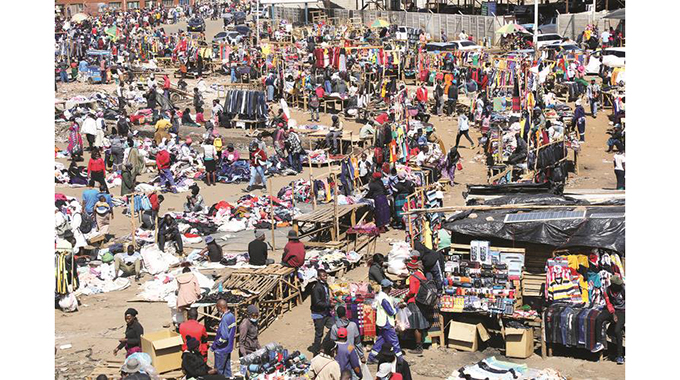EDITORIAL COMMENT : Planned upgrades offer permanent solution for Mbare

The regular cycles of destruction and erection of illegal trading shacks around the Mbare bus terminus and the Mupedzanhamo market area in the north of the suburb highlights both the demand for the services these traders offer and the need for larger managed and legal markets.
Markets need to be where customers congregate, or where customers know they can find the markets they are looking for. At the same time the markets should be close to where stallholders live, so they do not have to try and find expensive transport to move their goods, and do not need to spend large sums daily on bus fares.
The two areas of Mbare, where large illegal markets suddenly emerge, the second the authorities turn their back, and both are close to and are basically extensions of legal markets, show that we need radical solutions to the problems. Mbare Musika grew up as a bus terminus in colonial times. The colonial “Salisbury City Council” did not want large numbers of black people hanging around the city centre waiting for a bus and so designated a block of land in the middle of its main “native location” and also allowed a degree of vegetable trading nearby.
That bus terminus, incidentally, gave “Salisbury” its common everyday name, which became the official name soon after independence and caused the renaming of the suburb to Mbare to avoid confusion.
The main wholesale produce market, in those days fed by white farmers, was in Eastlea near the VID, convenient to the railway line for those farmers more than a few kilometres from Harare and easy to access for what were known as the smallholders, many in Ruwa, the large subdivided estates to the east of Ruwa, and Glen Forest and surrounding areas, although Tynwald had its share.
Independence, the ending of racial divisions and land reforms all worked together to concentrate the main produce market in Mbare, in some ways not the most ideal location for a farmers and wholesale market serving a large city since it is difficult to cope with the traffic and the waste such markets generate. Mupedzanhamo grew from a vaguely regulated market area near the huge hostel complex because of its incredibly convenient location, close to the city centre and the highest density of people and close to where the main southern arterial road and the main ring road connecting most of the then industrial areas crossed.
The problems facing both market areas are the result of several factors besides the obvious one of them being exceptionally convenient places where traders and customers can get together.
The city council took little action, either to expand and regulate the markets, or even to ensure basic hygiene and safety, while those who prey off the poor instead of going into honest business ran what amount to protection rackets.
These are the people known as “space barons”, although their methods and business could be derived from any mafia instruction manual. They provide what order largely exists on a day-to-day basis, and enforce their space allocations, and live off the sums they extort from those who need to trade in return for what little security of tenure is on offer. Frequently they are connected to corrupt municipal officials and councillors who they pay off for their own protection.
The solutions are obvious and need not cost a fortune. Mupedzanhamo is an obvious market area. It needs to be properly developed within a fenced or walled area, with adequate security, public toilets and preferably electrical connections, on pre-paid meters so Zesa does not have to cope with defaulters.
A bit of roadwork is needed to ensure access without the present horrific congestion; this requires slip lanes and a parking area.
The structures can be permanent, and while they need not be up-market, they need to be safe and look respectable. Prefabricated walls under basic roofs would work. Honest municipal officials, with strong safeguards against corruption, would allocate the spaces and collect the fees, which should be roughly in line with what the protection rackets now charge.
In other words the huge illegal market should be converted into a huge legal market, managed and secured by uncorrupted officers. The space barons, who will try to extend the market, can be kept at bay with a daily bulldozer if necessary.
In any case, there will need to be a continuous effort to drive off the protection rackets so they cannot take over the legitimate market. So long as the legitimate market is large enough the needs of both traders and customers can be met.
Mbare Musika possibly needs a more radical rethink. The bus terminus needs to remain, since everyone inside Harare and across the country knows where it is and the route system is centred on this terminus.
But the main farmer and wholesale market could be moved so long as a lot of thought is given to the new site and the facilities it requires. The site must be nearby, preferably abutting onto Mbare, but with good main road access for both vehicles and push carts along with an area where those who split bulk buys into retail packages could do that work, although retail sales would be elsewhere.
A good water supply and decent sanitation are obvious, but some imagination is needed for waste management. It should be possible to split the organic waste and the plastic and other inorganic waste at a large enough site.
The inorganic waste could be trucked out, but the organic waste could easily be stacked in a series of composting boxes and sold off, for council revenue, as it matures. The farmer market would also require an area where people who work there and visit could buy something to eat and drink, safely and without health risks.
In any case this would clear space in the Musika for a proper regulated market to serve the Harare suburb with the largest population. Again this could be controlled and regulated. The revamp of the market areas would probably, on the fees that can be charged, be unlikely to make a decent profit for the council, but the fees could cover the costs and there would be cost savings: less bulldozer hire, lower health costs, less crime, less major street cleaning.
What is now needed is a concentrated effort by Government (necessary because the council is not the most efficient in history), the council, and the traders, with input from potential customers whose views do matter, with some professional town planners who can sympathetically put the whole thing together in a way that satisfies everyone.
The modest capital funds can be found if we work towards a permanent solution. A monthly, or weekly, visit by bulldozers is not a solution.










Comments